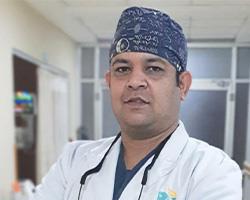Search Result: 4

Dr Bhabani Prasad Bordoloi
Consultant, GI Surgery MBBS, MS (General Surgery), Mch( GI Surgery)
Registration No
5340255
Language
English

7 years experience overall

Paschim Boragaon , Guwahati
WED, WED(04:00 PM-08:00 PM)

Dr Intekhab Alam
MBBS, M.Ch
Registration No
4329070
Language
English, অসমিয়া, বাংলা, हिंदी

8 years experience overall

Paschim Boragaon , Guwahati
MON- SAT, MON- SAT(10:00 AM-05:00 PM)

Dr Manuj Kumar Saikia
MBBS, MS, Mch
Registration No
4329071
Language
English, অসমিয়া, हिंदी

22 years experience overall

Paschim Boragaon , Guwahati
MON- SAT, MON- SAT(11:00 AM-05:00 PM)

Dr Digvyjay Sharma
MS, DNB (Gastro)
Registration No
4164507
Language
English, অসমিয়া, বাংলা, हिंदी

13 years experience overall

Zoo Road Guwahati , Guwahati
MON- SAT(08:00 AM-09:30 AM, 06:00 PM-08:00 PM)
Frequently Asked Questions for Lung Transplant in Guwahati
The life expectancy after a lung transplant varies based on various factors such as the patient’s age, overall health, and adherence to post-transplant care. On average, after a successful lung transplant, patients can expect to live for five to ten years or longer.
If the body rejects a lung transplant, it means that the immune system recognises the transplanted lung as foreign and attacks it. It may lead to symptoms like shortness of breath, coughing, and fever. Rejection is treated with increased immunosuppressive medications and close monitoring by the transplant team.
The most common cause of death after a lung transplant is chronic rejection, known as bronchiolitis obliterans syndrome (BOS). It is a progressive condition where the small airways in the transplanted lungs become obstructed, leading to decreased lung function over time.
Lungs are considered one of the most challenging organs to transplant due to their complex structure and inherent susceptibility to injury. Also, finding suitable donor lungs can be difficult because they must match the recipient’s blood type and have similar size and tissue compatibility.
A lung transplant is recommended when other treatments, such as medication and pulmonary rehabilitation, are no longer effective in managing end-stage lung disease. It is considered when the patient’s quality of life and prognosis are significantly compromised due to the disease.
Patients must have end-stage lung disease with a prognosis of less than two years of life without transplantation. They should be in good health, have no active infections or malignancies, and be willing and able to comply with post-transplant care requirements.
Patients unsuitable for lung transplantation include those with severe heart disease, uncontrolled infections or malignancies, significant liver or kidney dysfunction, active substance abuse issues, advanced age, or other medical conditions that may significantly impact their survival or recovery.
After a lung transplant, patients require close monitoring in the hospital for several weeks. They will be on immunosuppressive medications to prevent organ rejection and must follow a strict medication schedule. Regular follow-up visits, pulmonary rehabilitation, and lifestyle modifications are essential for long-term recovery.
The duration of a lung transplant procedure varies depending on the complexity of the surgery and the patient’s condition. On average, the surgery can take anywhere from four to eight hours.
The recovery time after a lung transplant varies for each individual but typically ranges from three to six months. During this period, patients must follow a strict medication regimen, attend regular follow-up appointments, and undergo pulmonary rehabilitation to regain strength and function.
Preparation for a lung transplant involves thorough medical evaluations, including physical examinations, blood tests, imaging studies, and pulmonary function tests. Patients also undergo psychological assessments and counselling to prepare their mental state for the procedure and post-transplant care.
There are two types of lung transplantation: single-lung transplant (SLT) and double-lung transplant (DLT). In SLT, one diseased lung is replaced, while in DLT, both lungs are replaced. The choice is based on the patient’s condition and the availability of suitable donor organs.
The success rate of lung transplants varies based on many factors including the disease’s severity, the patient’s overall health, and any complications.
A lung transplant is a surgical procedure where a diseased or damaged lung is replaced with a healthy lung from a deceased donor. It is performed to increase the lifespan and improve patients’ quality of life with end-stage lung disease.
A lung transplant is carried out by a cardiothoracic surgeon who specializes in heart and chest surgeries. They work closely with a multidisciplinary team including pulmonologists, anaesthesiologists, and critical care specialists.
Other Specialities in Guwahati
- Best Urologist in Guwahati
- Best Pulmonologist in Guwahati
- Best General Physician in Guwahati
- Best Endocrinologist in Guwahati
- Best Cardiologist in Guwahati
- Best Oncologist in Guwahati
- Best Radiologist in Guwahati
- Best Orthopedics in Guwahati
- Best Hepatologist in Guwahati
- Best Gynecologist in Guwahati
- Best Dermatologist in Guwahati
- Best Gastroenterologist in Guwahati
- Best Psychologist in Guwahati
- Best Ent Specialist in Guwahati
- Best Nephrologist in Guwahati
- Best Rheumatologist in Guwahati
- Best Diabetologist in Guwahati
- Best Psychiatrist in Guwahati
- Best Neonatologist in Guwahati
- Best Dentist in Guwahati
- Best Dietitian in Guwahati
- Best Haematologist in Guwahati
- Best Pediatrics in Guwahati
- Best General Surgeon in Guwahati
Top Hospitals in India
- Hospitals in Ahmedabad
- Hospitals in Bangalore
- Hospitals in Bhubaneswar
- Hospitals in Bilaspur
- Hospitals in Chennai
- Hospitals in Delhi
- Hospitals in Guwahati
- Hospitals in Hyderabad
- Hospitals in Indore
- Hospitals in Kolkata
- Hospitals in Madurai
- Hospitals in Mumbai
- Hospitals in Mysore
- Hospitals in Nashik
- Hospitals in Noida
- Hospitals in Visakhapatnam
- Hospitals in Lucknow
- Hospitals in Bhopal
- Hospitals in Karur
- Hospitals in Kochi
- Hospitals in Nellore
- Hospitals in Trichy
- Hospitals in Kakinada
© Copyright 2024. Apollo Hospitals Group. All Rights Reserved.
 +91 8069991061
Book Appointment
+91 8069991061
Book Appointment






 Call Now
Call Now




